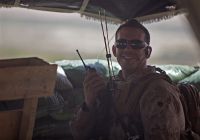COMBAT OUTPOST SHUKVANI, Afghanistan, Aug. 22, 2011 — As a torrent of bullets whizzed past their heads, the Marines in Observation Post 8 quickly dropped to the ground, narrowly avoiding what could have been their deaths. As they lifted themselves off of sandbags covering the bottom of the small bunker, they looked up to see Marine Corps Staff Sgt. Christopher Sharp smiling down at them.
“What are you ducking for?” Sharp asked with a chuckle. “They’re not going to hit you. They’re too far away.”
Sharp quickly turned around in his seat, a makeshift wooden bench situated toward the front of the bunker, and raised a pair of binoculars to his eyes. The small-arms fire that caused the Marines behind him to fall prone continued to buzz past their heads. The Marines were at the post providing support for Operation Black Sand, a mission designed to destroy a bazaar being used by insurgents to manufacture and distribute improvised explosive devices.
Sharp, a native of Mesa, Ariz., is the chief for Supporting Arms Liaison Team Delta, 1st Air-Naval Gunfire Liaison Company, at this combat outpost on the western side of the Helmand River, across from Sangin and on the southern tip of the Musa Qalah district of Afghanistan’s Helmand province.
With five combat deployments under his belt, Sharp is no stranger to being shot at. As a joint terminal attack controller in a unit that specializes in coordinating close air support for ground forces, Sharp has had his share of close calls.
“As a Marine I’m taught that once you take ground, you don’t give it back, so I’m not going to duck down,” Sharp said. “I’m going to try to [locate] where the enemy is so that I can fire back or direct the fire back on to it.”
During Operation Black Sand, while the 2nd Combat Engineer Battalion used assault breaching vehicles to move into the bazaar, Sharp primarily stayed inside the small, cubicle-sized sandbag bunker that overlooked their position. His mission was to be the liaison between his team and the combat engineer battalion’s mission commander, Marine Corps Capt. John Shubeck. Throughout the operation, Sharp and his Marines provided the engineers with surveillance, reconnaissance and close air support.
“As long as the CEB commander is up here, I’m up here,” Sharp said. “I’m supporting him. So whatever support he needs, I want to be right next to him to provide it for him.”
The operation lasted about a week. Sharp was busy about 20 hours each day, wearing a radio headset and peering through binoculars that seemed to be permanently attached to his eyes. For hours on end, Sharp scanned for insurgents firing at the coalition forces, trying to get eyes on suspicious activity.
“The real challenging part about this operation is trying to find where the enemy is, which is kind of fun when they’re firing at you,” he said. “The real hard part lies with [the combat engineers]. They’re the ones that have to destroy this bazaar and clear out all the IEDs. Those are the guys that are really in danger out there. I’m just here to support those guys — making sure that the danger they can’t see, I can see and [trying] to help mitigate them from taking small-arms fire through close air support or artillery.”
During the operation, the night offered no rest to Sharp. Late one night, intelligence reports said insurgents were approaching the coalition forces who were protecting the engineers near the bazaar. Sharp got on his radio and ordered a pair of illumination rounds to be fired.
“It lets them know, ‘Hey, I see you. You better relax and not start anything,’ ” Sharp said.
The rounds burst a couple of hundred yards over the insurgents’ heads, giving away their position. The insurgents quickly scattered. Once Sharp was convinced the threat was neutralized, he caught a few hours of shuteye with his rifle, radio and binoculars by his side.
In addition to providing fire support, Sharp also coordinated casualty and medical evacuations.
On the morning of Aug. 6, a 2nd CEB Marine was hit by an IED and needed immediate evacuation. In less than a halfhour, the wounded Marine was on a helicopter and headed to a nearby trauma unit.
Shubeck said he has had 29 Marines in his command become casualties, and that he never had seen a medical evacuation executed so quickly.
“Twenty minutes from IED strike to the Marine being on the bird, … you don’t see that often,” said Shubeck, a native of Centerville, S.D. “That’s just a testament to how well-versed [Sharp] is at his job.”
“I’m glad we were able to get the aircraft in fast for him,” Sharp said. “That’s the only thing I was worried about – making sure we we’re able to save his life. That’s the rewarding part right there: knowing that at least he survived. … That, and harassing the [insurgents].”
Ultimately, Operation Black Sand was deemed a success. The combat engineers leveled the Ladar Bazaar using line charges packing more than 1,700 pounds of C4 explosives. While the line charges were being detonated, Afghans from surrounding villages came out to watch the fireworks show. Many of them were children. Sharp just shook his head.
“The kids around here have to grow up in this kind of environment,” he said. “I’ve got two children of my own, and I’d never want them in this kind of environment. I don’t even tell them what I really do over here. I don’t tell my wife that stuff until I get home, because I don’t want her to worry.
“As long as she thinks I’m safe and good to go,” he added, “then everything is kosher.”
Source:
U.S. Department of Defense
Office of the Assistant Secretary of Defense (Public Affairs)

 von
von 